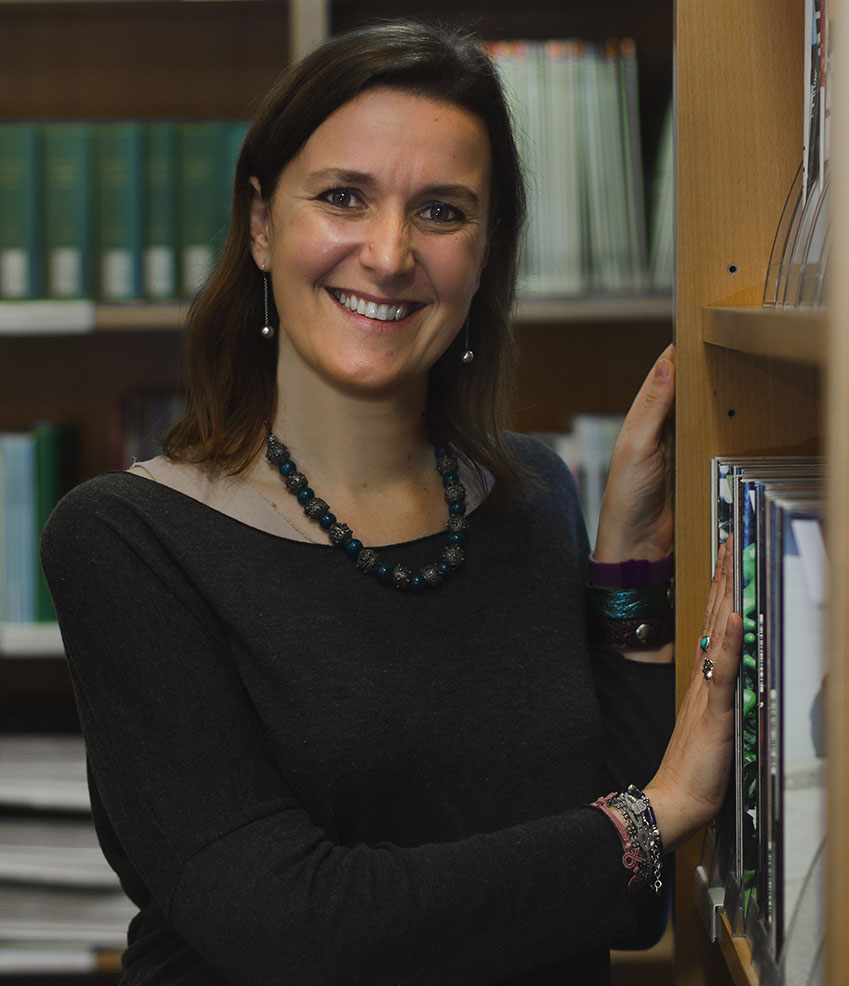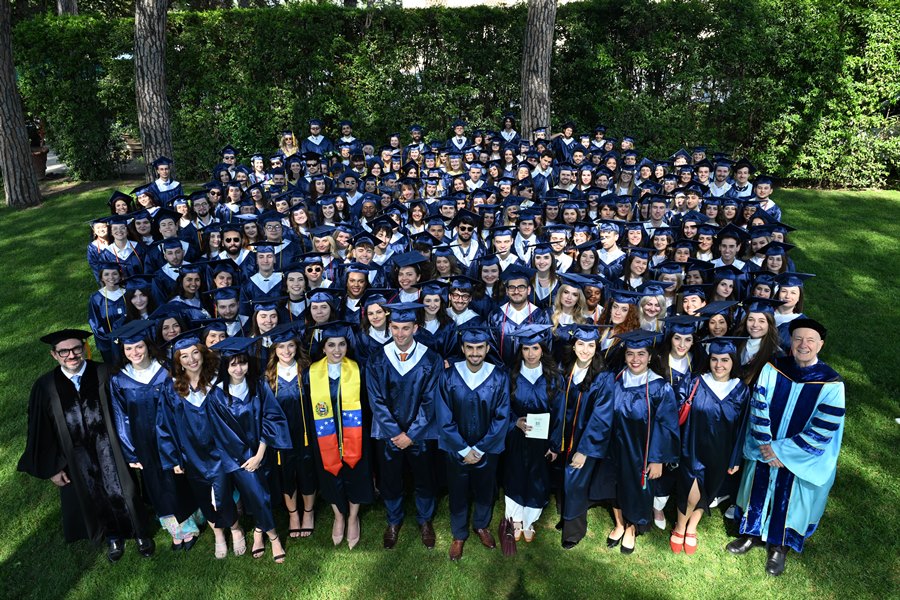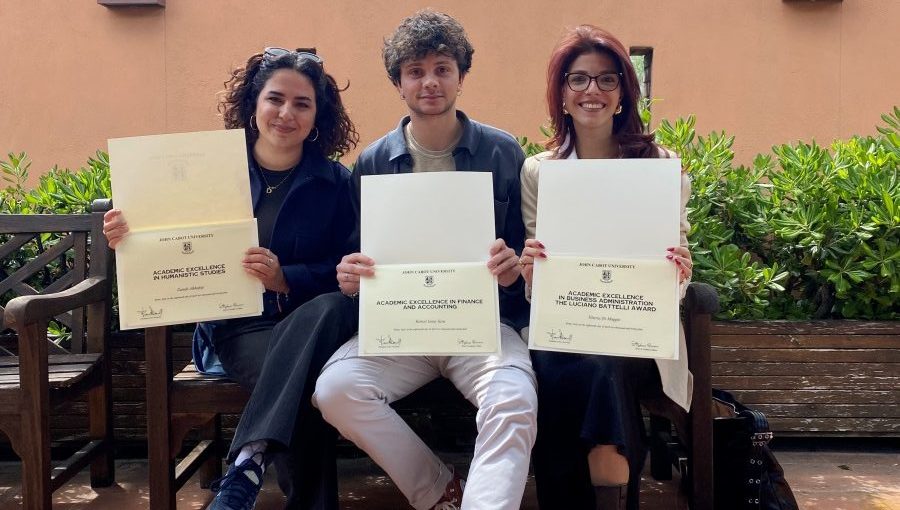A Space Conducive to Learning: Head Librarian Livia Piotto
Livia Piotto has been working at JCU’s Frohring Library for over 15 years. She holds an Italian laurea degree in foreign languages and literature, with a thesis on the translation of oral Native American literature into written English. Livia is an active member of AMICAL, the American International Consortium of Academic Libraries. She has recently been promoted to Head Librarian.

Livia Piotto
Congratulations on being promoted to Head Librarian! What does your new position entail?
Becoming head librarian represents an opportunity for growth in my career, but it is also quite a challenge, given that the focus of my job has changed entirely. In my previous position as a reference and instruction librarian, I was used to working in close contact with students and faculty on a daily basis. I would go into the classroom to teach students how to access library resources and collaborate with faculty to ensure that students were becoming proficient researchers in their disciplines. As head librarian, I instead had to learn how to look at the library from a managerial perspective and ensure that it responds to the needs of the community. I oversee all library operations, from selecting and acquiring the resources that support the academic curriculum, to cataloging these resources and making them available to users, to providing assistance in accessing these resources. In doing so, I work closely with the rest of the library staff, and I have to say that all my colleagues have been instrumental in providing me with the necessary tools to grow and to learn how to become a library manager, which I am not yet, because I am still learning every day. As head librarian, I also supervise all the library facilities and my goal is to make the library a welcoming environment where everyone at JCU can find not only the resources that they need, but also a space that is conducive to learning. I want the JCU community to know that librarians are there to respond to their information needs without judgment, because being curious is what allows people to learn about the world.
What advice would you give to students conducting research in the Frohring Library? What are some of the services/opportunities offered that they should take more advantage of?
My advice to students is to explore the resources that the library has to offer as one of the first steps in their research process, and not just rely on Google. The library has a lot to offer, including hidden gems that make the students very happy once they are discovered.
Underused services are the workshops that we offer every semester. We do promote them in collaboration with the faculty, but students tend not to see these workshops as opportunities to learn new skills that could eventually help them save time while doing research. When they do attend one of these workshops, maybe because a professor required them do it, they respond enthusiastically.
The perks of being a librarian: what are its most rewarding and challenging aspects?
People might think that the best part of being a librarian is that you have access to all the books in the world. Of course, you can find interesting readings in any library, but libraries do not and cannot own everything. So, yes, if you are an avid reader like me, you can definitely find interesting books to add to your reading list.
However, I think that the most rewarding aspect of working in a library is having the opportunity to work with people, being able to help them find what they need, and even what they didn’t know they needed. I like when patrons come to you as their last resort and end up finding the answers they were looking for. I love when they see the librarian as some sort of magician who always has a trick up their sleeve.
The biggest challenge of the job is dealing with barriers that prevent the dissemination of knowledge in an equitable way. Having to deal with publishers and their restrictive business models is highly frustrating, especially when you would just like to help your users access what they need. For this reason, most libraries are supporting the open access movement and business models that encourage the dissemination of knowledge with as few barriers as possible.
You have been working at JCU for over 15 years. How has the University changed throughout the years?
It might be simplistic, but I have to say that the University has grown in every single aspect. I used to know almost all the students by name, which is not possible anymore. I still get to know students and faculty, but in a different way. Not only has the number of students, faculty and staff increased, but we have grown in programs and activities offered, both from the academic perspective and the student life one. We have become a complex, growing entity, and this certainly makes things more complicated, but also more challenging and engaging.
In a world growing increasingly digital, what is the role of libraries/books?
I often think that the abundance of information that is available online will mean the end of libraries, because everything seems so easy to find, and access to information is just a couple of clicks away. But then, I think that there is still a need for someone who organizes that information and curates it in a meaningful way. We cannot just rely on algorithms to decide what we should read and where we should find our answers. Libraries should change – they cannot just be a place of books. They must become the place where people find not only the information they need, but also support in evaluating it. Libraries have become more and more essential in teaching digital literacy skills that we all need.
Moreover, I don’t see books disappearing from our lives anytime soon. I often encounter students and faculty who still prefer the old print book because it is less volatile and gives a sense of security: what we learn is not going to disappear, because the book is there in its physical reality. As a librarian concerned with the physical space books take, I have to say that there is a contingent need to move towards the digital, because eBooks allow libraries to grow almost infinitely without creating space problems. And they allow what the print book does not: to be read by more than one person at a time.
What are three books you think everyone should read and why?
I am not a big fan of recommending books that everyone should read, because who am I to give that kind of advice? What I can do is give you three books that have meant a lot to me.
I mostly like fiction that describes humanity at its best and worst. I like to read about universal human characters, and how our humanity has shaped the world and could shape the future. I am highly fascinated by dystopian fiction, which I read as a cautionary tale for what the world could become. In some cases, I hate to see how dystopian worlds have somehow become a reality.
One of the books that I always recommend is Blindness by Nobel prize winner José Saramago. I read this book because a colleague here at JCU recommended it to me. It is one of the most powerful books I have ever read. Despite its title, it is highly visual. When I was reading it, I was seeing the brutality of humankind. Another book that I want to recommend together with Blindness is its satirical follow up Seeing. Even if this book is less powerful than Blindness, it is always so current whenever there is a political election: what would happen if all the ballots were left blank? Who would be in power when all citizens decide that they don’t want to vote for anyone? These books make you think in ways that very few books can.
The second book that I would recommend is The Handmaid’s Tale by Margaret Atwood, one of my favorite writers. Once again, this is a very powerful story of a very dystopian world. It is such a disturbing story that it makes me wish that nobody was ever even capable of imagining it. But at the same time, I think that it is a story that needs to be told, because we need to see what the world could be if certain things were to happen.
No Italians in my book recommendations? I could suggest The Name of the Rose by Umberto Eco, a book that I read when I was 13 or Diario Notturno by Ennio Flaiano, a book that describes the current Italian reality perfectly, even though it was written over 50 years ago.
I could go on and on. That’s why you should never ask a librarian to recommend books!





